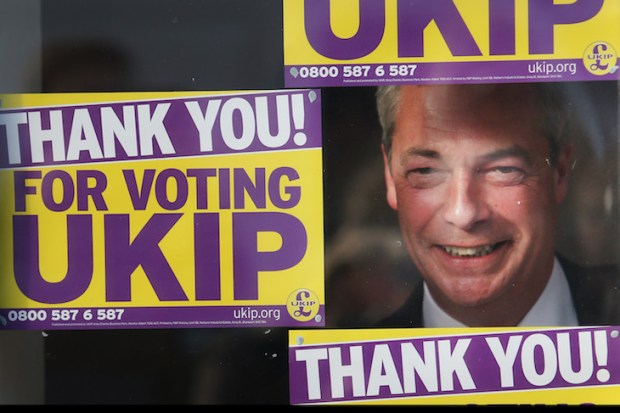It can happen that something ought to feel wrong yet somehow doesn’t; and you wonder whether this means that in some deep way it could be right. Take for example a discussion on BBC Radio 4’s Today programme on Saturday last week. The subject was the rise of the ‘Teflon’ United Kingdom Independence Party. I ought to have found the programme’s handling of this to be inappropriate; yet it felt both appropriate and natural. In this column I shall discuss why.
Radio presenters do not give explanatory headlines to political interviews. At about 8.20 a.m. Evan Davis simply said ‘Let’s talk about Ukip’ and off they went, ‘they’ being himself and his two guests, Isabel Hardman of this magazine and Dr Robert Ford, a politics don from Manchester University. There was no indication that Ukip itself had been invited to join the discussion; the party was being discussed almost clinically, as a phenomenon. Mr Davis’s key questions were essentially as follows: (1) ‘Why does Ukip so easily survive scandals [about expenses, etc]?’ (2) How should parties like the Conservative party respond to the threat? Should they ‘tack to the right’, as Davis put it, or ‘take Ukip on’? (3) How would one advise the main parties as to ‘the real vulnerability of Ukip’?
I found the discussion fascinating and wouldn’t have wanted it any other way. But when the programme moved to the next item and I thought about what we’d just heard, it struck me there had been something very odd about focus and format. Ukip were being discussed not as players in the political game, but as spoilers to the political game: a kind of viral infection which it was proving devilishly difficult to shake off. Viewed like this, there was no more cause to involve the party itself in the discussion than there would have been cause — were we discussing an outbreak of meningitis — to invite someone to put the virus’s side of the story. Yet we were discussing the party that leads all the others in opinion polls anticipating the European elections later this month. We were discussing the favourite as if it were a rank outsider. Why?
Here’s why. Ukip has assumed the form of a political party but it is not a political party: it is a mutiny within Conservatism. In this case the mutiny has been externalised, so the Tory guns appear trained on a target beyond the fortress walls. But really they are aimed inwards, at an insurrection. The principal mutineers and their leader, Nigel Farage, are indeed without. But, within, their philosophy — their ‘mindset’, if you will forgive the word — is implanted inside the heads of many Conservative MPs and party members. It is within those heads, and between those heads and opposed heads, that the real battle is taking place. Farage & co., though apparently outsiders, are actually outriders: outriders for what is at heart a very Conservative rebellion.
Nigel Farage is not an anti-Conservative: he’s a rebel Conservative. He’s not my kind of Conservative, but he does represent a strain of thinking that is powerfully present in the party. He doesn’t really think (whatever he may protest) that there ought to be a need for Ukip at all: he regrets the need. He thinks it would and could go away if only the present Tory party would embrace the approach and policies that Ukip has set out. He’s sorry the leadership of the Conservative party doesn’t see it that way, but he believes not only that millions nationwide see it that way, but also that the Tories should be listening to them, and offering them a home.
Mr Farage, I believe, feels in his heart that he’s a kind of outcast from the Conservative party; and many of his members and millions of his voters feel the same. They have been forced into the wilderness (they feel) by a party that ought to love and listen to them, but doesn’t. A fierce and energetic minority of Tory MPs, party members and loyal voters would like to welcome them back.
That is why I say that this is really a kind of civil war, with the rebel troops externalised in the form (but without the substance) of an extraneous, free-standing political party. This is what makes the conflict so bitter and confusing.
It is also why supporters of the outriders are not much bothered by talk of scandal (directed against the outriders) or by sneers that the outriders don’t have a proper manifesto — or contradict themselves, or each other, or are unfaithful to their wives, or whatever. This doesn’t much bother sympathisers because they’re only pretending to see the outriders as a real political party; they know deep down that they’re a rebellion, not a party.
Finally, it explains why the possibility that the UK Independence Party could deliver a Labour government, by robbing the Tories of seats, troubles some supporters but fails to nullify their support. If the aim is to remake Conservative politics in Britain (they reason), then the present Conservative party has to be shown that it cannot win in its unreconstructed form. It’s a pity (they think) but there’s no other way.
As for slightly desperate Tory talk about how Ukip are just as much of a threat to the Labour party because they’re attractive to many working-class voters — well, true; but the Conservative party is attractive to many working-class voters, too, and could not win without them. It should worry us Tories, not console us, that this kind of populism appeals in quarters where we too are seeking votes.
I don’t, in the above, pretend to have some novel explanation of what’s going on. I’m describing what I think we all already know, deep down, is going on. Ukip is a Tory sickness, not a national party; and — as that Today discussion cruelly demonstrated — nobody knows the cure.
Got something to add? Join the discussion and comment below.
Get 10 issues for just $10
Subscribe to The Spectator Australia today for the next 10 magazine issues, plus full online access, for just $10.















Comments
Don't miss out
Join the conversation with other Spectator Australia readers. Subscribe to leave a comment.
SUBSCRIBEAlready a subscriber? Log in